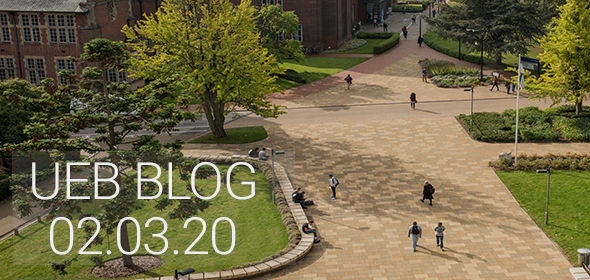Author: Shaun Williams, Executive Director of Engagement and Advancement
This is the first UEB blog for two weeks, as there was no meeting on Monday 24 February.

A number of issues were discussed under the Vice-Chancellor’s Business section at the start of this week’s meeting:
- There was an update on the global COVID-19 (coronavirus) outbreak and our University’s continuing preparations for a range of possible disruptive scenarios. This is a fast-evolving situation and the University continues closely to monitor the latest Government advice, and is liaising regularly with national and local health bodies to ensure we are well prepared to deal with further developments. Our regularly-updated COVID-19 (coronavirus) webpage contains the latest official guidance for staff and students, and provides answers to a series of frequently asked questions (general, staff-centric and student-centric in nature). The need for any non-essential international travel should be considered very carefully, taking into account the potential risks of the country or area to be visited, and the latest Foreign Office advice.
- There was an update on the current phase of industrial action affecting Southampton and 73 other universities. The University continues to put in place measures to minimise the impact of this action upon our community. UEB heard there was a constructive meeting with campus trade union colleagues last week, and that the University has now committed to putting in place a major programme of work to engage constructively with local union branches on issues including workload, casualisation and gender pay inequality. This new initiative, which will be resourced as a major project, was positively received at the meeting.
- The Vice-Chancellor told UEB there has been a significant and welcome improvement in the University’s non-continuation rates – the percentage of first-year students who are no longer in Higher Education the year after entry. We are now below our sector benchmark, putting us in the upper third of Russell Group universities relative to our benchmark. UEB was grateful for the support given to students by staff across the University, to enable them to succeed in continuing their studies.
- The Vice-President (Research and Enterprise) advised UEB that the first round of applications for the prestigious new Leverhulme International Professorships are now open, and requested suggestions for nominations. Aimed at helping maintain the UK’s international standing as a desirable research destination, nominations should be for outstanding world-leading research leaders currently working outside the UK who could fill strategically important positions in this country. This will therefore be for people who are already demonstrably real world-leaders in their field. Each UK university may make only one bid per round, with up to 10 grants being issued in the first round of the competition.
- UEB strongly supported a proposal to create a new University of Southampton Academic At-Risk Fellowship. Working with the Council for At-Risk Academics (CARA), the Fellowship will enable a scholar at risk of persecution or harm to continue their research and develop their professional skills, whilst contributing to the academic community at Southampton. The new University of Southampton Academic At-Risk Fellowship will support the strategic goal of maintaining Southampton as a global university with an international reputation for transforming lives, and will put us in the vanguard of developing robust mechanisms to support at-risk colleagues around the world.
On the rest of today’s agenda, which was the monthly 10-Year Plan UEB:
- There was an update on the Pricing and Scholarships Project, an important piece of work which has been reviewing our international UG and PGT fees, discounts, and scholarships. At one point we had 81 different pricing points, which made for a very confusing and potentially counter-productive approach. The data and market analysis produced will help inform a future pricing strategy and our broader international recruitment strategy.
- There was a discussion about how to approach the increasing importance of digital in everything we do. Key to this discussion was striking a balance between encouraging and empowering local initiatives, whilst also recognising areas that would benefit from a pan-university transformative approach to the use of technology in order to enable and enrich what we do. UEB agreed a proposal, under the umbrella title Digital X, to identify and agree a set of core digital themes and map the activity currently underway across the University against these themes to identify opportunities, overlaps and gaps. This work will be progressed further and brought back to a future 10-Year Plan UEB.
- Finally, there was an important discussion about a new process for assessing and prioritising potential new 10-Year Plan projects, and how innovation can be encouraged during the regular annual business planning process. The first meeting of the new monthly Access Group took place last week – this group will assess potential 10-Year Plan projects to determine if they are genuinely transformational. Those that are considered transformational will be considered by a new prioritisation group meeting in April and November each year, which will assess proposals taking account of each initiative’s potential benefits, their deliverability, and overall costs.
Proposals that are considered more ‘business as usual’ improvements will have an opportunity to be considered as part of the regular annual business planning process. The Vice-Chancellor made clear that, although rigorous cost control remains an important factor during the annual business planning cycle, he is keen to ensure that value-for-money innovation and entrepreneurship is also encouraged and enabled during the business planning process.